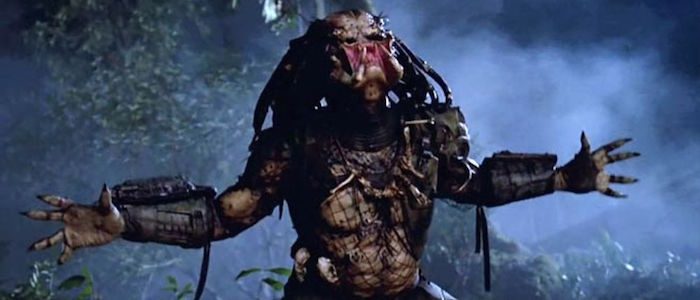
What do you get when you mix an invisible hunter-alien with thermal vision, two future U.S. governors, the man who played Apollo Creed in Rocky, and a band of other hypermasculine types in the jungle? To paraphrase Carl Weathers (as himself) in Arrested Development: “Baby, you got a stew going.”
It’s a stew of meatheads and monster menace. The word “testosterone” is one you’ll hear tossed around a lot in reference to Predator, the original 1987 movie starring Arnold Schwarzenegger. With the way the camera luxuriates in Schwarzenegger’s bulging bicep as he clasps hands with Weathers and flexes, it’s easy to see why. His character, Dutch, is the last we see disembark the chopper at the beginning of the movie. One by one, Dutch’s men have come filing out of the chopper until the hero is revealed kicking back in his seat, sporting aviator sunglasses and chomping on a cigar. Predator exudes machismo right from the get-go. There’s more to this movie, however, than off-color jokes and muscle-bound men on a mission.
One of the men in Dutch’s elite unit is, of course, played by a young Shane Black, whose screenwriting career had gotten off to a big start that year with Lethal Weapon. Now Black is back as the director of The Predator, the sixth overall movie in the franchise (counting crossovers with Aliens). As this newest installment hits theaters, let’s take a look back at what made the first Predator so great.
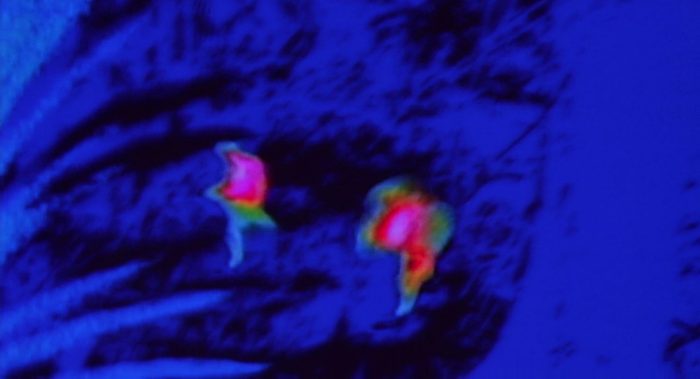
Predator is a riff on the classic monster movie in which the characters (in this case, commandos) get picked off one-by-one. Like Jaws and Alien, Predator withholds sight of its monster until late in the movie. Many other flicks try the withholding-sight trick, but that usually only works if you’ve actually got an ace in the hole, something to show at the end. In a sense, the entire film hinges on the monster and whether or not that creature works visually. Predator is that rare breed of movie where the monster fully lives up to the hype.
Just remember: in an alternate universe, Jean-Claude Van Damme played the Predator as a ninja. In our reality, he was not a good fit for the project and Kevin Peter Hall (who played Harry in Harry and the Hendersons) took over. Thank the movie gods for that.
Before we glimpse the titular trophy-hunting Predator, we see through its thermal vision (an ingenious device) as it stalks Dutch and his unit through the jungle. We hear it chittering, we see its claw reach out in POV. All the while, concern is mounting among the men. They’ve found bodies skinned alive. Even their half-Sioux tracker, Billy, who is normally no-nonsense and doesn’t fear any man, is spooked and has been acting squirrelly. “There’s something in those trees,” he says, staring off into the jungle.
These guys are obvious bad-asses. They wield Bowie knives. They carry giant guns (“Time to let Old Painless out of the bag.”) They have the physique of bodybuilders. One of them even has a dry-shaving tic.
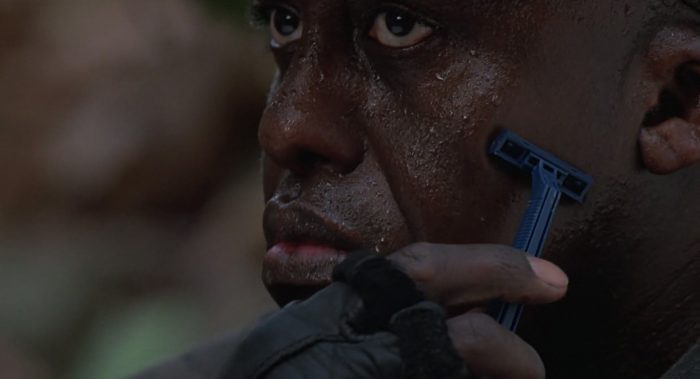
It’s weird the things that stay with you from movies sometimes. I first popped Predator in the VCR on a sleepover in junior high school (sounds about right for a movie with this kind of locker-room humor), and more than any other image, the one that kept coming back to me over the years was that one of Bill Duke’s character, Mac, drawing a disposable razor down over one side of his face, then suddenly stopping and digging the razor into his cheek, drawing blood before snapping it off mid-handle.
The Predator bleeds, too — luminescent green blood that indicates it’s not invulnerable. “If it bleeds, we can kill it,” Dutch says. That’s another thing that separates Predator from your typical monster movie. Because these men are soldiers, they are trained to fight back. Sometimes fighting back involves them haphazardly spraying bullets into the jungle, shooting without even knowing what they’re aiming at … but if nothing else, that fighting instinct ensures that they go out in style when the Predator inevitably catches up with them. Think of the way Billy makes his last stand against the Predator on that tree bridge. Now contrast that with the character of Lambert in Alien, who functions as a surrogate for the audience’s fear and is thus reduced to a sobbing mess as the Xenomorph zeroes in for the kill.
Larger-than-life personalities like Jesse “The Body” Ventura, a real-life soldier turned pro wrestler turned actor turned governor, imbue each character in Predator with a memorable quality. The quotes fly fast in Predator and while not all of them work — some of Schwarzenegger’s characteristic one-liners fall flat (“Stick around,” “Knock-knock”) — there are too many that land to deny the movie’s special sauce. Cheesy yet delicious, that sauce has its purest distillation of flavor in the exchange between Ventura’s character, Blain, and Poncho, played by Richard Chaves.
Blain: “Son of a bitch is dug in like an Alabama tick.”
Poncho: “You’re hit. You’re bleeding, man.”
Blain: “I ain’t got time to bleed.”
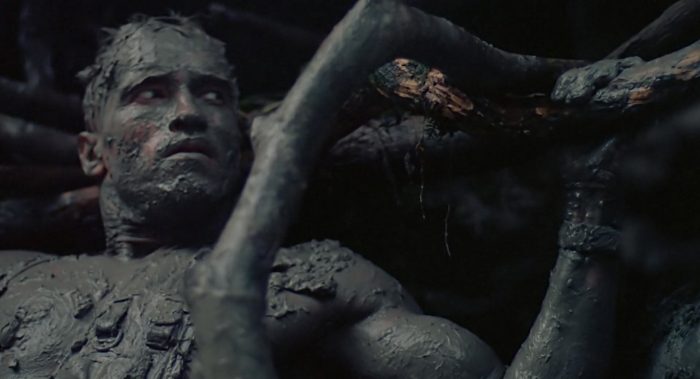
Here the Final Girl of slasher-movie tradition becomes the ‘roided-out Last Man Standing. By the end of the movie, Dutch is covered in mud, giving primal yells as he uses his wits (yes, he has those) to rig a trap for the Predator. When the dreadlocked monster finally uncloaks and unmasks, rearing its fearsome mandibles, letting us see Stan Winston’s full facial design for it, the quote, “You are one ugly motherfucker,” rather undersells how terrifying it is. There’s a sense of suffocating peril that descends on Dutch’s final, close-quarters confrontation with the Predator. This thing is toying with him. It kills for sport, collecting spines and skulls. Mimicry enables it to generate human sounds (but let’s pretend that ridiculous human laugh, where the Predator cackles, “Mwah-ha-ha!” at the end, just never happened.)
Composer Alan Silvestri is the unsung hero of this movie. Buoyed to great cinematic heights by his expressive musical score, Predator is an ace film that serves up a scorpion on a knife tip, both literally and figuratively. Rewatching the movie in 2018, not long after the 30th anniversary of Die Hard — a movie that invented a whole sub-genre of knockoffs — it’s easy to find oneself reflecting on the lost luster of the ‘80s and ‘90s action genre. In Predator, Dutch insists, “My men are not expendable,” and the 2018 viewer is left thinking, “Oh, but they will be, Arnold. Give it time.”
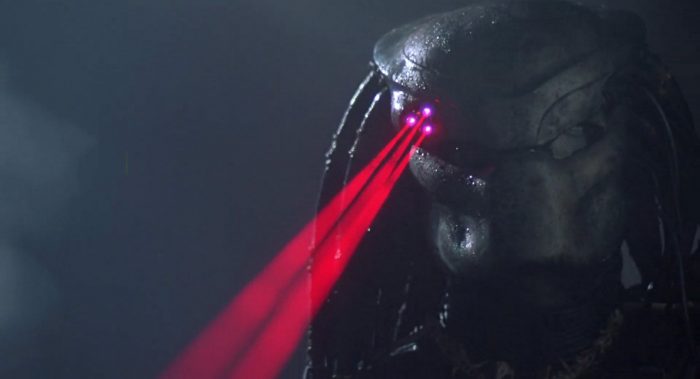
Somewhere along the way, guys like Schwarzenegger stopped putting butts in seats at the theater. Pretty soon, the action movie stars of old would need to pool their combined might into a super-group called The Expendables to maintain visibility. Meanwhile, director John McTiernan, who helmed a string of genre classics during this era, including Predator, the aforementioned Die Hard, and The Hunt for Red October, would literally land himself in jail: not director’s jail, but federal prison.
The release of the new sequel The Predator this weekend has gotten somewhat overshadowed by Hurricane Florence and the scandal over a convicted sex offender being featured in a now-cut scene from the movie. Over and above that, the reviews for the film are not looking so hot. That’s a shame, and it only makes it seem that much more like the Predator franchise was destined to be a one-trick pony, incapable of reinventing itself as successfully as, say, the Mission: Impossible franchise.
Oh, well: even if this new movie disappoints, fans will always be able to unite around the original, inspired by Dutch’s rallying cry of “Get to the choppa, everyone! Let’s all go rewatch Predator!”
The post Let’s Talk About Why the Original ‘Predator’ is So Great appeared first on /Film.
from /Film https://ift.tt/2OnpmpJ

0 Comments